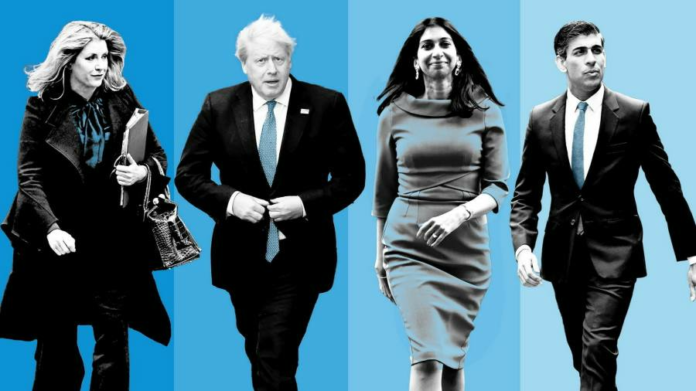This article is an on-site version of our Disrupted Times newsletter. Sign up here to get the newsletter sent straight to your inbox three times a week
Today’s top stories
-
EU leaders hailed a fall in gas prices just hours after agreeing plans for a price cap. German chancellor Olaf Scholz reluctantly backed the proposal after initially arguing that it would risk diverting supplies to other countries that offer a higher price. Spain and France agreed to build an undersea pipeline between the two countries, dropping the idea of a link over the Pyrenees.
-
Giorgia Meloni told Italy’s president that her rightwing coalition was ready to form a government with her as prime minister, after days of rancour inside the alliance over cabinet posts.
-
Barclays is challenging a £50mn fine from UK regulators over the bank’s allegedly “reckless” failure to “disclose certain arrangements” about controversial Qatari fundraising 14 years ago, during the height of the financial crisis.
For up-to-the-minute news updates, visit our live blog
Good evening,
Disrupted Times was created to chart the unsettling period that people are now living in across the world as a result of a pandemic, an energy crisis and a brutal war in Europe. What we did not expect was the extent that disruption would become the new norm for UK political life.
The finale of the latest season of this Westminster “psychodrama” came yesterday with the resignation of Liz Truss, now infamous as the country’s shortest-serving prime minister, quitting the job after 44 days of intense economic and political turmoil.
You can better understand the reasons for her downfall and the contenders for the job — including wannabe comeback kid Boris Johnson — by following our UK politics coverage. For a daily morning update on the Tory Game of Thrones, sign up here for Stephen Bush’s excellent Inside Politics newsletter.
The economic challenge for Truss’s successor is daunting, with fresh data this morning again highlighting the problems piling up in the prime ministerial in-tray.
Government borrowing jumped to a much higher than expected £20bn last month, thanks to higher debt interest payments. This was £2.2bn more than in the same month last year and the second-highest September reading since monthly records began in 1993.
Retail sales were also worse than expected, shrinking 1.4 per cent between August and September and fuelling fears of recession — perhaps understandable when you read that UK consumer confidence is hovering around a 50-year low.
The drumbeat of gloomy data adds to fears of a Halloween slashfest of public spending cuts when newly-installed chancellor Jeremy Hunt unveils his plan for filling the £40bn hole in UK public finances. (Assuming his new boss, who is likely to take over just days before, is on board with Hunt’s remedies.).
Whoever takes the crown also faces the tough task of regaining the trust of the markets, writes markets editor Katie Martin. The initial muted reaction to Truss’s resignation suggests her departure — and the end of Trussonomics — had already been priced in.
Business too will need some reassuring. The recent turmoil resembles a “playbook for bad business management”, writes columnist Cat Rutter Pooley, where a new chief executive comes in, unveils a strategy so disastrous it sparks an immediate investor exodus — and then sacks the finance director. And if there’s one thing that deters outside investment, it’s uncertainty, columnist Tim Harford notes.
The price for these errors will be paid by the British public, many of whom will end up worse off than they were before the tax-cutting “mini” Budget. Tax, pensions and energy policy have all been tossed into the political salad spinner, says consumer editor Claer Barrett, referencing the Daily Star’s stunt of pitting a lettuce against the PM to see which would expire first.
The FT editorial board brings us back to the deadly serious nature of the chaos, which has shattered the UK’s credibility, with three prime ministers in eight weeks, two of whom have come to power without a general election.
“The government cannot be surprised that if the UK appears to act like an emerging market with chaotic governance, investors treat it like one,” the FT concludes.
Need to know: UK and Europe economy
The EU is bracing for more refugees from Ukraine as Russian forces target the country’s power infrastructure. Ukrainian president Volodymyr Zelenskyy said 30 per cent of power stations had been destroyed.
Ukrainian officials meanwhile were taken aback by suggestions that US Republicans could scale back support for Kyiv if the party wins the House of Representatives in next month’s midterm elections.
Need to know: Global economy
According to futures markets, investors now expect the Federal Reserve to raise US interest rates to 5 per cent next year as it continues to fight surging inflation.
As Chinese growth slows, there are rising expectations that Xi Jinping, who is set for a third term as president, will pivot towards redistribution and a possible crackdown on the ultra rich. This week’s decision to delay third-quarter economic data continues a trend towards opacity, says chief data reporter John Burn-Murdoch.
As nations retreat behind borders, a new global order offers new opportunities, argues columnist Rana Foroohar in her guide to a deglobalising world.
On the other hand, those geopolitical threats can be pretty scary, including a potential Chinese invasion of Taiwan before 2024.
Need to know: business
Financial markets may have done for Liz Truss, but for the London Stock Exchange it has meant a 16 per cent year-on-year rise in third-quarter revenues to £1.9bn. Around 30 per cent of the group’s revenues come from trading and transactions, which “tends to benefit from the volatility and the uncertainty in an environment like this”, the exchange’s chief executive said.
Blackstone, the world’s largest alternative asset manager, reported a dip in profits as tightening financial conditions and plunging stock market valuations dramatically slowed the sale of investments.
InterContinental, the owner of the Crowne Plaza and Holiday Inn hotel chains, said US business travel revenues were now back at pre-pandemic levels, dispelling some fears that remote working would permanently cut industry demand.
Another hopeful sign for the recovery in air travel came with European short-haul carrier Wizz Air’s plans to start flights from the UK to the Middle East and Asia. Some airlines have a new problem, however: not enough planes.
One of the EU’s top lawyers has dealt a blow to hopes that a new era of telecoms dealmaking was on the way, backing a 2016 decision from Brussels to stop what would have been a blockbuster merger of O2 and Three.
Science round-up
US health officials are investigating a controversial study from Boston University that created an artificial form of Covid-19, reigniting a debate over whether this type of research poses the risk of accidental infection that could start another pandemic.
Kate Bingham, the head of the UK’s vaccine procurement team, tells the inside story of the risks, criticism and political interference she faced in her new book on the Covid pandemic response.
Ladybirds, food dye and fungi are all being pressed into use as biological alternatives to toxic pesticides. Read this and more in our new special report: Sustainable Food and Agriculture.
Our Big Read examines the case for carbon capture, first put into practice more than 50 years ago but which has never fully lived up to its backers’ promises. The technology has now received a significant boost from tax incentives in the new US Inflation Reduction Act. Here’s our film on the technology from earlier this year.
Covid cases and vaccinations
Total global cases: 620.1mn
Total doses given: 12.9bn
Get the latest worldwide picture with our vaccine tracker
Some good news

Dr Jessica Wade, a research fellow at Imperial College London, has written more than 1,750 Wikipedia biographical entries for women and people of colour in science since 2018.
Wade told Disrupted Times: “We really overlook women’s inventions and innovations and breakthroughs in science, and history books have done a really bad job of documenting them. And now we’re in an age where we can rectify that record, but also we can cement it for future generations.”
Thanks for reading Disrupted Times. If this newsletter has been forwarded to you, please sign up here to receive future issues. And please share your feedback with us at [email protected]. Thank you.






